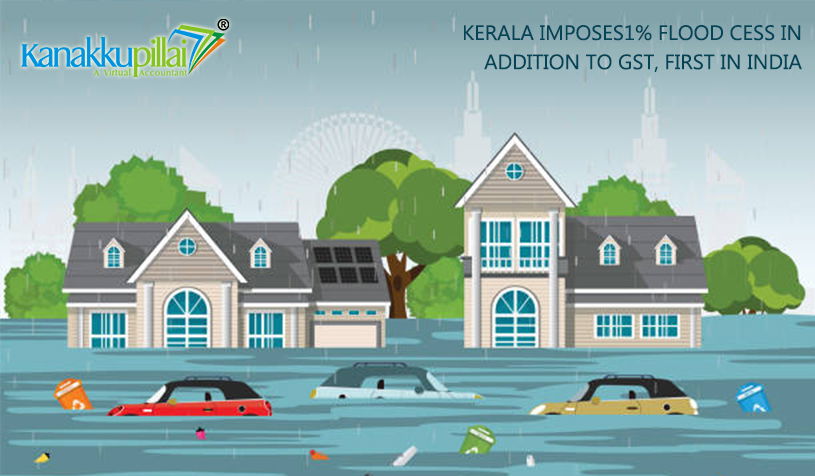![]()
The flood cess implemented with a fall in GST slab of up to 12% or more.
Thiruvanandhapuram district in Kerala has seen heavy floods in the year 2018-19. This stands as the reason to collect addition charges apart from GST. Such an implementation is followed for the first time in India. The Aim for collecting such fund is to rebuild the entire state where ever it is affected by flood.
As per Finance Minister’s statement “It has taken us almost a year to work out a special cess within the framework of GST. The delay is understandable, because it is for the first time that the GST council is giving permission to a state government to have an additional cess, apart from GST,” which was conveyed by NDTV.
A population of 3 lakh people have become desolate as of now with a death of mankind which ranges up to 300 in numbers along with a loss of Rs. 19,500 crore worth commodities which is as estimated by the government records were destructed. It was an unexpected loss and the state minister states this in multiple terms such as “special situation” and asked the public as “How do we meet this expenditure? There must be some maneuverability for the state government,”. Such sudden expenditures are to be settled with sudden rules and regulations. The cookery items such as cooking oil or other medicines that holds 5% GST does not add 1 % when purchased separately. Similarly, exemptions are given for rice, salt, vegetables or fuels like petrol, diesel, which will not be included under this criterion.
The cess for flood will be implemented only for the items, which holds the GST rate of 12% or above are subjected. “We expect to collect 700 crore rupees in one year. The flood cess will be implemented for two years, so we are looking at something around Rs. 1400 crore,” said by Mr. Isaac. Flood affected roads and village roads were worked with funding for financing construction activities. Allocation of 1000 crore for the purpose of PWD works and another 1400 crore were allocated for village roads.
“During last state government’s period, VAT rates increased by 2%. Right now, rates of GST – the real effective tax rate is 4-5 points lower than the pre-GST combined tax. One additional percentage will not be a very heavy burden, but must be seen as contribution to rebuilding the state,” were in response to the criticism of opposition. The opposition Leader, Mr. Ramesh Chennithala quoted that the “price-hike policies” did not affect the population of Kerala as it was imposed by the Centre and the state government.
Apart from flood cess, Immediate Payment Service (IMPS) rates and interest rates were lowered by State Bank of India for all the fixed deposit on every other aspect. The above mentioned essential points are implemented from 1st August 2019. The slashed EV charges were12% and is slashed to 5% and the charges on their respective charger to around 5% from 18%. This Reduction was favourable for auto industry where the ecosystem were encouraged rapidly adopting a mobile user friendly environment.
IMPS is an online money transfer that is available for 24 X 7 and up to Rs. 1000 there are no charges included. Around ₹600 crore are intended to be raised from the cess collected. Thus, this levy and cess charges are beneficial for those industries to grow their sales and reach of the new launch among the public was rapid.
This flood cess were collected because of the damage caused by the Central and state government.





